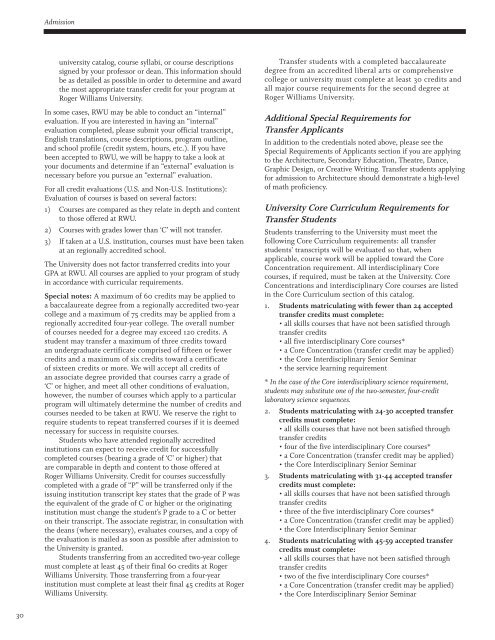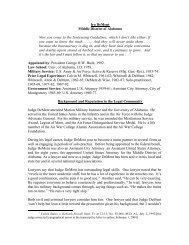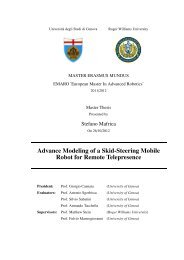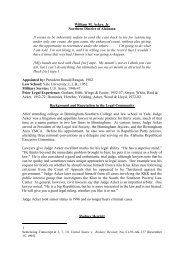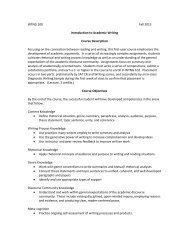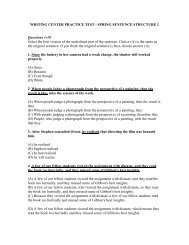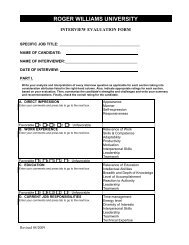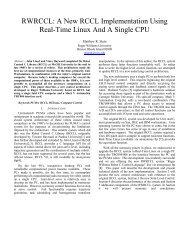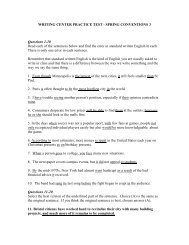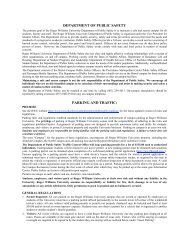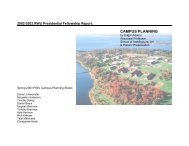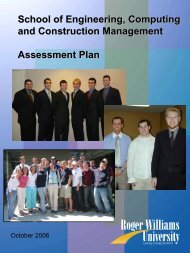Download PDF - Roger Williams University
Download PDF - Roger Williams University
Download PDF - Roger Williams University
Create successful ePaper yourself
Turn your PDF publications into a flip-book with our unique Google optimized e-Paper software.
Admission<br />
university catalog, course syllabi, or course descriptions<br />
signed by your professor or dean. This information should<br />
be as detailed as possible in order to determine and award<br />
the most appropriate transfer credit for your program at<br />
<strong>Roger</strong> <strong>Williams</strong> <strong>University</strong>.<br />
In some cases, RWU may be able to conduct an “internal”<br />
evaluation. If you are interested in having an “internal”<br />
evaluation completed, please submit your official transcript,<br />
English translations, course descriptions, program outline,<br />
and school profile (credit system, hours, etc.). If you have<br />
been accepted to RWU, we will be happy to take a look at<br />
your documents and determine if an “external” evaluation is<br />
necessary before you pursue an “external” evaluation.<br />
For all credit evaluations (U.S. and Non-U.S. Institutions):<br />
Evaluation of courses is based on several factors:<br />
1) Courses are compared as they relate in depth and content<br />
to those offered at RWU.<br />
2) Courses with grades lower than ‘C’ will not transfer.<br />
3) If taken at a U.S. institution, courses must have been taken<br />
at an regionally accredited school.<br />
The <strong>University</strong> does not factor transferred credits into your<br />
GPA at RWU. All courses are applied to your program of study<br />
in accordance with curricular requirements.<br />
Special notes: A maximum of 60 credits may be applied to<br />
a baccalaureate degree from a regionally accredited two-year<br />
college and a maximum of 75 credits may be applied from a<br />
regionally accredited four-year college. The overall number<br />
of courses needed for a degree may exceed 120 credits. A<br />
student may transfer a maximum of three credits toward<br />
an undergraduate certificate comprised of fifteen or fewer<br />
credits and a maximum of six credits toward a certificate<br />
of sixteen credits or more. We will accept all credits of<br />
an associate degree provided that courses carry a grade of<br />
‘C’ or higher, and meet all other conditions of evaluation,<br />
however, the number of courses which apply to a particular<br />
program will ultimately determine the number of credits and<br />
courses needed to be taken at RWU. We reserve the right to<br />
require students to repeat transferred courses if it is deemed<br />
necessary for success in requisite courses.<br />
Students who have attended regionally accredited<br />
institutions can expect to receive credit for successfully<br />
completed courses (bearing a grade of ‘C’ or higher) that<br />
are comparable in depth and content to those offered at<br />
<strong>Roger</strong> <strong>Williams</strong> <strong>University</strong>. Credit for courses successfully<br />
completed with a grade of “P” will be transferred only if the<br />
issuing institution transcript key states that the grade of P was<br />
the equivalent of the grade of C or higher or the originating<br />
institution must change the student’s P grade to a C or better<br />
on their transcript. The associate registrar, in consultation with<br />
the deans (where necessary), evaluates courses, and a copy of<br />
the evaluation is mailed as soon as possible after admission to<br />
the <strong>University</strong> is granted.<br />
Students transferring from an accredited two-year college<br />
must complete at least 45 of their final 60 credits at <strong>Roger</strong><br />
<strong>Williams</strong> <strong>University</strong>. Those transferring from a four-year<br />
institution must complete at least their final 45 credits at <strong>Roger</strong><br />
<strong>Williams</strong> <strong>University</strong>.<br />
Transfer students with a completed baccalaureate<br />
degree from an accredited liberal arts or comprehensive<br />
college or university must complete at least 30 credits and<br />
all major course requirements for the second degree at<br />
<strong>Roger</strong> <strong>Williams</strong> <strong>University</strong>.<br />
Additional Special Requirements for<br />
Transfer Applicants<br />
In addition to the credentials noted above, please see the<br />
Special Requirements of Applicants section if you are applying<br />
to the Architecture, Secondary Education, Theatre, Dance,<br />
Graphic Design, or Creative Writing. Transfer students applying<br />
for admission to Architecture should demonstrate a high-level<br />
of math proficiency.<br />
<strong>University</strong> Core Curriculum Requirements for<br />
Transfer Students<br />
Students transferring to the <strong>University</strong> must meet the<br />
following Core Curriculum requirements: all transfer<br />
students’ transcripts will be evaluated so that, when<br />
applicable, course work will be applied toward the Core<br />
Concentration requirement. All interdisciplinary Core<br />
courses, if required, must be taken at the <strong>University</strong>. Core<br />
Concentrations and interdisciplinary Core courses are listed<br />
in the Core Curriculum section of this catalog.<br />
1. Students matriculating with fewer than 24 accepted<br />
transfer credits must complete:<br />
• all skills courses that have not been satisfied through<br />
transfer credits<br />
• all five interdisciplinary Core courses*<br />
• a Core Concentration (transfer credit may be applied)<br />
• the Core Interdisciplinary Senior Seminar<br />
• the service learning requirement<br />
* In the case of the Core interdisciplinary science requirement,<br />
students may substitute one of the two-semester, four-credit<br />
laboratory science sequences.<br />
2. Students matriculating with 24-30 accepted transfer<br />
credits must complete:<br />
• all skills courses that have not been satisfied through<br />
transfer credits<br />
• four of the five interdisciplinary Core courses*<br />
• a Core Concentration (transfer credit may be applied)<br />
• the Core Interdisciplinary Senior Seminar<br />
3. Students matriculating with 31-44 accepted transfer<br />
credits must complete:<br />
• all skills courses that have not been satisfied through<br />
transfer credits<br />
• three of the five interdisciplinary Core courses*<br />
• a Core Concentration (transfer credit may be applied)<br />
• the Core Interdisciplinary Senior Seminar<br />
4. Students matriculating with 45-59 accepted transfer<br />
credits must complete:<br />
• all skills courses that have not been satisfied through<br />
transfer credits<br />
• two of the five interdisciplinary Core courses*<br />
• a Core Concentration (transfer credit may be applied)<br />
• the Core Interdisciplinary Senior Seminar<br />
30


